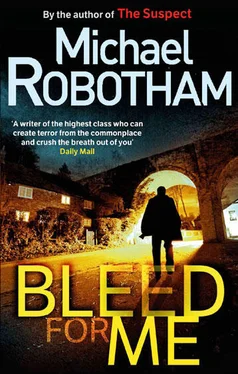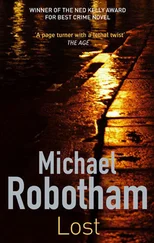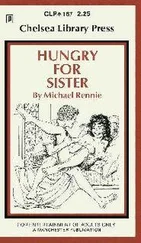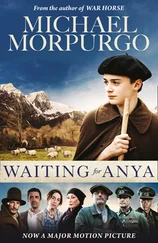Sticking to closed questions, I gently draw out her history, which takes a long time because her answers are devoid of detail. Sienna talks about school - her favourite subject is English, her favourite teacher is Mrs Adelaide. I ask about other subjects and other teachers.
An odd detail emerges. An omission. She doesn’t mention Gordon Ellis, her drama teacher, yet the musical is all she and Charlie have talked about for months. They have sung into hair-brushes and danced in front of the mirror.
I take her back to Tuesday and the rehearsal.
‘Do you remember getting into trouble with Mr Ellis?’
‘Yes.’
‘Mr Ellis was quite hard on you.’
‘I’m used to it.’
‘Do you like him?’
‘He’s OK.’
‘You babysit his little boy.’
‘Sometimes.’
‘How do you get home afterwards?’
‘He drops me.’
‘Did your father ever argue with Mr Ellis?’
Sienna’s hand rises. She doesn’t want to talk about it.
‘You don’t want to talk about your dad or Mr Ellis?’
Sienna’s hand rises again. As promised, I change the subject and ask her instead about Danny Gardiner.
‘Where did you meet him?’
‘It was ages ago. He went to school with Lance.’
‘But you hooked up with him?’
‘Yes.’
‘When was that?’
‘Early last year.’
‘Does he pick you up after school sometimes?’
She nods.
‘Where do you go?’
‘The cinema or the mall or just for a drive.’
‘Where did you go after Danny dropped you off last Tuesday?’
‘Nowhere.’
‘You mentioned your therapist, Robin. Is that where you went on Tuesday?’
‘No.’
‘Where then?’
Her fingers begin to rise.
‘You don’t want to tell me.’
She nods.
‘Who are you protecting, Sienna?’
‘No one.’
I back off again, asking her instead about later that night.
‘What time did you get home?’
‘About ten-thirty.’
‘Did someone drop you?’
‘I caught the bus to Hinton Charterhouse and walked the rest of the way.’
Two motorists reported seeing a blonde-haired girl in a short dress walking down Hinton Hill on the night of the murder.
‘That’s a two-mile walk.’
She doesn’t reply.
‘Were there lights on in the house?’
‘I don’t remember.’
‘Think back. Put yourself outside the house again. It’s late. You’re tired. You’ve walked home. You step through the gate. What do you see?’
‘A light in the hall.’
‘Is that unusual?’
‘Mum normally leaves it on.’
‘Where is your key?’
‘In my schoolbag.’
‘Can you see yourself getting the key out, unlocking the door?’
She nods.
‘You’re opening it.’
‘Yes.’
‘What do you see?’
‘I look on the phone table to see if there are any messages on the answering machine or letters for me. Mum sometimes leaves me a note.’
‘What about this time?’
‘No.’
‘What do you see?’
‘The door under the stairs is open. Daddy’s overnight bag is inside. Unzipped. I see his shaving gear and dirty clothes.’
‘How does that make you feel?’
‘He’s not supposed to be home until Friday.’
‘Does that bother you?’
‘I don’t like being alone with him.’
‘What else do you see?’
‘A light at the top of the stairs.’
‘What about downstairs?’
‘I can hear the TV.’
‘What are you thinking?’
‘If I can get to my room I’ll be OK. There won’t be a scene. I can lock the door and go to bed and he won’t bother me.’
‘How does he bother you?’
Her fingers rise and fall. She doesn’t want to talk about it.
‘What happens next?’ I ask.
‘I creep up the stairs, trying to be quiet. The fourth step has a squeak. I step over it.’
Her breath quickens.
‘What is it?’
‘I hear something.’
‘What do you hear?’
‘A toilet flushing, then a tap running . . . in the bathroom.’
‘You’re sure?’
‘He’s upstairs. I have to hurry.’
‘Where were you?’
‘At the top of the stairs. My room is just there. I have to be quick. I have to get inside.’
Her hands go to her mouth.
‘What?’
‘I’m falling.’
‘Down the stairs?’
A long pause. ‘He’s lying on the floor . . . Daddy. Not moving. I’m on top of him.’
Her whole body is shaking.
‘What do you see?’
‘Blood. Everywhere. The floor is wet. I’m sitting in it. I try to scream, but no sound comes out. And I’m wiping my hands over and over, but I can’t get it off.’
‘Can you hear anything?’
‘A rushing sound in my head - it’s like the wind only louder and it fills every space and blocks out every other sound. I can’t make it stop.’
Sienna covers her ears.
‘Is there someone else in the house, Sienna?’
She’s not listening. I hold her face in my hands, making her focus on me. ‘Is there someone in the house?’
A whisper: ‘Yes.’
‘Can you see who it is?’
‘No.’
Fear floods her eyes. Suddenly, she’s on her feet, trying to run. I catch her before she can take more than two steps, wrapping my arms around her, lifting her easily. She’s fighting at my arms, her legs pumping. Mucus streams from her mouth and nose.
‘Shhh, it’s OK. You’re safe. You’re with me.’
Slowly the fear evaporates. It’s like watching an inflatable-pool toy spring a leak and sag into a crumpled puddle of plastic. I put her back on the sofa and she curls her knees to her chest, closing her eyes. Spent. Raw.
The interview has taken three hours but Sienna can tell me nothing more. Her emotions can’t be detached from her memories. I risk traumatising her if I keep pushing.
Whoever killed Ray Hegarty was still in the house when Sienna came home. SOCO found blood in the S-bend of the sink. The killer was cleaning up. Wiping the blade clean.
An intruder? A robbery gone wrong? There were no signs of forced entry, yet Sienna’s laptop is missing. Far more expensive items were untouched.
Ray Hegarty wasn’t expected home until Friday. Helen Hegarty worked nights. Sienna spent most evenings alone. Whoever killed Ray Hegarty was inside the house. Waiting.
Who were they waiting for?
The journey to London takes just over two hours by car. I leave after the morning peak and arrive before midday, pulling into a side street off Fulham Palace Road where I’m held to ransom by a parking machine.
Walking back to the main road, I head towards the echoing shadows of Hammersmith flyover past empty shops and ‘For Lease’ signs. London is bleeding. It’s like a virus that is spreading from the top down. No job is secure enough. No mortgage small enough.
London has changed in the past two years. People have changed. I thought it would be something violent and shocking that altered this city - an outrage like the July 7 bombings or our version of 9/11 - but it was something else: a financial meltdown, a banking crisis triggered on the far side of the world by poor people who couldn’t repay their loans.
As I get near the Thames I can smell the mud flats and brine. I’m visiting a friend - a former detective inspector with the Metropolitan Police called Vincent Ruiz, who retired five years ago.
Broad like a bear with a busted nose and booze-stained cheeks, Ruiz has had three marriages and three divorces. World-weary and fatalistic, I sometimes think he’s a walking, talking cliché - the heavy-drinking, womanising ex-detective - but he’s more complicated than that. He once arrested me for murder. I once rescued him from himself. Friendships have flourished on less.
Читать дальше












